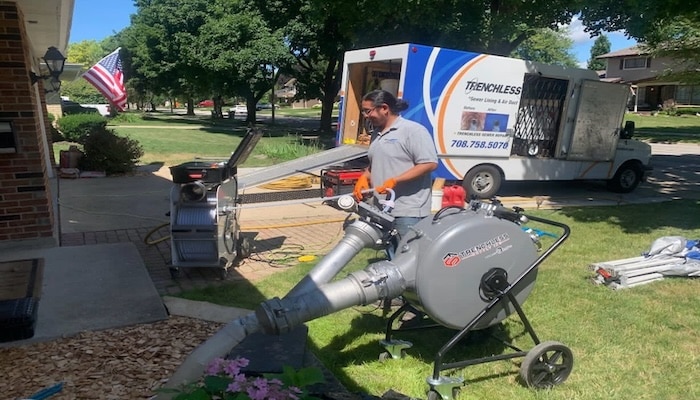Reliable Sewer Line Repair For Your Chicago, IL Home
Cured-in-place pipe lining, pulled-in-place pipe lining and epoxy coating are three methods of trenchless sewer pipe rehabilitation. Determining the best method to use depends on the condition and location of the pipes in need of repair, which can often be determined with a sewer video inspection. The team here at Trenchless Innovations have decades of combined experience locating the source of sewer trouble and determining which trenchless sewer line repair method is best to resolve your issues with minimum trouble.
Is your sewer line in need of repair? Then we're here to help! Send us a message online or call 708-758-5070 today!

Sewer Line Repair FAQs
Fixing a cracked sewer pipe typically involves several steps. First, a sewer camera inspection is conducted to assess the extent and location of the crack. If the crack is minor and not causing significant issues, it may be repaired using epoxy lining or a patch. In some cases, trenchless repair methods like epoxy coating can be employed to minimize excavation. Consulting with a sewer professional is essential to determine the best repair approach based on the specific circumstances.
On average, sewer lining can cost between $80 to $250 per foot of lining. However, prices can range from $4,000 to $20,000 or more for a complete lining job. The exact cost should be determined after a professional inspection and assessment of your specific sewer system’s needs.
Pipe relining, also known as trenchless pipe repair, offers several advantages. Firstly, it eliminates the need for extensive excavation, reducing disruption to landscaping and structures. It is more cost-effective since it requires less labor and material. Pipe relining is also faster, often completed within a day, minimizing downtime. It creates a seamless, jointless pipe within the existing one, preventing root intrusion and leaks. Additionally, it extends the lifespan of the pipe and can be used for various pipe materials. Overall, pipe relining is a less invasive, cost-efficient, and durable solution for repairing damaged or deteriorating pipes.
Pull-in-place pipe lining (PIPP) sewer line repair effectively addresses various types of pipe damage:
- Cracks and Fractures: Seals cracks and restores pipe integrity.
- Corrosion: Repairs weakened pipe walls due to corrosion.
- Root Intrusion: Seals areas where roots have infiltrated, preventing blockages.
- Misaligned or Offset Joints: Helps realign and seal shifted joints.
- Holes: Patches holes to prevent sewage escape and groundwater entry.
- Wear and Tear: Remedies general deterioration from age or use.
PIPP provides a durable solution without extensive excavation, ideal for urban or landscaped areas.
Pull-in-place sewer line repair is versatile but has some limitations regarding pipe size. Generally, it can be used on pipes ranging from about 2 inches to 48 inches in diameter. The effectiveness and feasibility of using the pull-in-place method can depend on the specific conditions of the pipe system, including the extent of damage and accessibility. For very small or exceptionally large pipes, alternative trenchless repair methods might be necessary to ensure proper repair and long-term durability.
The duration of a pull-in-place (PIPP) sewer line repair process can vary depending on several factors, including the length and diameter of the pipe being repaired, the extent of the damage, and site conditions. Typically, a PIPP repair can be completed in one day, making it a quick solution compared to traditional excavation methods.
Preparation and setup can take a few hours, and the curing time for the resin used in the liner, which is critical to the repair’s success, can vary depending on the type of resin used and ambient temperature. Overall, the quick turnaround time is one of the major advantages of this method, minimizing disruption for homeowners and businesses.
The CIPP (Cured-In-Place-Pipe Lining) Method Of Sewer Rehabilitation
The most common sewer pipe rehabilitation method is cured in place pipe lining (CIPP). With this method, a new pipe is cured directly within a deteriorated one, creating a brand new pipe that prevents future deterioration and tree root intrusion. CIPP is an ideal solution because it results in minimal disruption to surroundings, unlike traditional sewer repair that requires excavation. Plus, customers are only without their services for the time it takes to install the liner!
The PIPP (Pulled-In-Place-Pipe) Method Of Sewer Rehabilitation
Another commonly used method of sewer pipe rehabilitation is pull in place pipe lining (PIPP). With this method, a fiberglass sheet impregnated with epoxy resin is wrapped around a rubber bladder. The bladder is then pulled into the deteriorated section of pipe, and inflated to press the liner against the inside of the pipe. The resins are then cured creating a solid section of liner over the affected area. This method is ideal for spot repairs and short sections of deteriorated pipes.
Fix Your Pipes Without Destroying Your Yard - Call Today!
Our experts stand ready to take a look at your sewer line, determine what works best for you, and deliver solutions with minimal disruption to your home. Don't hesitate to contact us with any questions or concerns about your sewer you may have - we're always here to help. Just drop us a message online or call 708-758-5070 today!
